Organized by: Members of the DFG Project “Demography and Democracy: How Population Aging Alters Democracy – The Case of Japan” and the Japanese-German Center Berlin (JDZB)
The symposium “Liberal Democracies under Demographic Pressure: Insights from Germany and Japan” held from May 14 to 16 in Berlin, brought together scholars, youth activists, and politicians from Japan and Germany. Our Team of the DFG-funded project “Demography and Democracy: How Population Aging Alters Democracy – The Case of Japan”, Prof. Dr. Gabriele Vogt, Anne-Sophie L. König, Stefanie Schwarte, Antonia Vesting and Alexander Dekant, co-organized this event with Dr. Phoebe Stella Holdgrün, Carolin Weidmann, and Jörg Reinowski of the Japanese-German Center Berlin (JDZB). The symposium was part of the JDZB’s event multi-year series on “The Future of Democracy”. It provided a vibrant forum for discussing one of the most pressing challenges that welfare states and liberal democracies face, namely the political ramifications of population aging.
Exploring the Political Impact of Population Aging in Germany and Japan
The symposium was kicked off with a keynote lecture by Prof. Dr. Achim Goerres (Universität Duisburg-Essen) entitled “The False Myths about Politics in Ageing Democracies”. Goerres challenged prevailing hypotheses or “myths” in both public and scientific discourse. These myths include assumptions that people become more conservative with age, that elderly citizens support only policies beneficial to their own age group, and that there is an inevitable political conflict between old and young. In his talk, Goerres deconstructed these myths and highlighted how young and aged citizens do not necessarily stand in a generational conflict but how their interests and goals for the future can align as well. His perspective set a thoughtful and critical tone for the following panel discussion during which Goerres was joined on stage by Prof. Toru Yoshida, Ph.D. (Doshisha University), Prof. Dr. Silke Übelmesser (Friedrich-Schiller-Universität Jena), Prof. Naoko Taniguchi, Ph.D. (Keio University) and chair Prof. Dr. Verena Blechinger-Talcott (Freie Universität Berlin).
Over the next two days, we discussed political participation of the young generation in Germany, Japan, and Singapore with Prof. Dr. Dr. h.c. Anette Eva Fasang (Humboldt Universität), Taniguchi, Dr. Norma Osterberg-Kaufmann (Humboldt Universität) and Shoko Tanaka, M.A. (Freie Universität Berlin), debunking the myth of political apathy among younger generations. We also engaged in a conversation with the young politicians, Maren Busch (Mayor of Diez), Momi Sako (Member of Assembly, Musashino), Tobias B. Bacherle (Member of German Bundestag, Bündnis 90/Die Grünen) and youth activist, Momoko Nojo (No Youth No Japan, Executive Director), who shared firsthand accounts of their strategies to amplify their voices. Lastly, Vogt wrapped up our symposium by moderating the discussion on ways forward for super-aging democracies like Germany and Japan with Taniguchi, Prof. Dr. Claudia Neu (Georg-August-Universität Göttingen/Universität Kassel), Prof. Masahisa Endo, Ph.D. (Waseda University) and Prof. Dr. Steffen Heinrich (Freie Universität Berlin).
Participants of the symposium furthermore took part in two excursions: first, we met with a representative of the “Servicestelle Jugendbeteiligung” in Berlin, who shared the organization’s innovative ways to engage young people in political education and participation with us. We then headed to the Bundestag, where we met with two members of the German-Japanese Parliamentary Friendship Group to discuss the manifold challenges to aging liberal democracies from a politician’s perspective.
Tackling Youth Disengagement: Insights on Enhancing Self-Efficacy from the Symposium
During the symposium’s many discussions, one concept in particular was raised frequently: self-efficacy or jikokōryokukan in Japanese. Self-efficacy is commonly understood as a feeling of fulfillment by engaging in political activity. In the face of grave challenges, it seems that a feeling of overburdening and hopelessness or a negative stance toward the future has taken hold of today’s youth. One of the pressing questions in this context will be how to increase the self-efficacy of the young generation.
The discussions and insights gained during the symposium will significantly contribute to our ongoing research within the DFG project. As we move forward, the exchange of ideas and experiences from this event will inform our efforts to understand and address the complex interplay between demography and democracy. This symposium reinforced the importance of interdisciplinary and international collaboration in tackling the challenges posed by population aging. We look forward to continuing this vital dialogue with colleagues in Germany and Japan.

We want to express our gratitude to all participants for their insightful presentations, fruitful discussions and enlightening comments, and our deep appreciation to the JDZB for the close cooperation to bring this symposium to life and for hosting us in their facilities. We acknowledge the support of the Department of Asian Studies at LMU Munich that provided travel grants to two doctoral students, Nathan Ewers and Jane Khanizadeh, and one undergraduate student, Adam Bernatík, thus enabling them to participate in the symposium.
Stay tuned for more updates on our research and upcoming reports by students of the Japan Center, who joined us in Berlin.
written by members of the DFG Project “Demography and Democracy: How Population Aging Alters Democracy – The Case of Japan”

Weitere Beiträge:
- Symposium „Liberal Democracies under Demographic Pressure“ – The False Myth of Politics in Aging Democracies: Ein Vortrag von Achim Goerres
- Symposium „Liberal Democracies under Demographic Pressure“ – Political Participation of the Young Generation
- Symposium „Liberal Democracies under Demographic Pressure: Insights from Germany and Japan“ – Panel „Ways forward for super-aging democracies“
